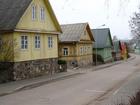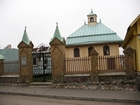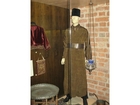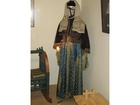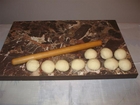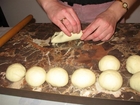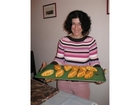Lithuanian Karaims: then and now
2006-12-06 12:04
There are only several thousand of them left in the world. |
In hope of lifting the veil of mystery shrouding the Karaim culture, our team is heading for a small Lithuanian town of Trakai, which is known as one of the biggest Karaim centers in the world. We are expecting to visit the Karaim Ethnographic Exhibition and the Trakai History museum, as well as to interview authentic representatives of the Karaim culture. The people who kindly agreed to provide us with some useful information regarding the way of life in the Karaim community are Alexandras Firkovicius and Jelena Shpakovskaja, the managers of the Karaim restaurants “Kybynlar” and “Karaimu 13” respectively.
To begin with, let’s consider some historical facts.
Lithuanian Karaims have been residing in Lithuania for more than 600 years. Their appearance in Lithuania is connected with the name of Vytautas the Great, the Grand Duke of Lithuania, who after his campaign to Black Sea shores, brought to Lithuania a group of 400 Karaim families from those areas, where they had lived for centuries.
Though the origin of Crimean Karaims is still open to debate, it has been generally considered that ethnically they derive from ancient Turkic tribes called Kipchaks, once forming a powerful Khazar state. Having arrived in Lithuania, Karaims settled in the town of Trakai, where most of them have been living up to the present day. Even though later other settlements were established in Lithuania, Trakai has always remained the administrative and spiritual centre of the Karaim community. Lithuanian Karaims enjoyed a broad range of privileges and a high degree of autonomy, and in 1441 were even granted the Magdebourg rights, meaning that the Karaim community became entitled to self-government.
Karaim religion is one of the most fascinating constituent parts of their identity. Lithuanian Karaims, as well as those living in other places of the world, practice a religion called Karaism. Having originated in Mesopotamia in the 8th century, Karaism is generally based on the Old Testament. Karaims utterly reject any other scriptures as later amendments or commentaries to the Holy Writ. What forms the basis of their religion is the sole Old Testament. The word "Karaim" comes from the Hebrew word “kara”, meaning "to read (the Scripture)".
As for the Crimean Karaims, it is believed that as Karaism reached the Crimean peninsular, some pagan Turkic tribes kipchaks, who had been living there under the Khasar kaganate, simply converted to this religion. Therefore, Lithuanian Karaims display an interesting combination – they are ethnic Kipchaks who once converted to Karaism, and in the 14th century were invited to settle in Lithuania.
Karaims pray in a place of worship called Kenesa.Typically, Kenesa is decorated with floral and geometrical ornaments, as it is strictly forbidden to depict humans in sacred places.
Another essential feature of the Karaim culture is their language. However unbelievable, having spent over 600 years on Lithuanian land, Karaims have managed to retain it. Though spoken rather scarcely these days, Karaim hasn’t been forgotten. Moreover, strong attempts are being made to revive it: there are summer schools of the Karaim language organised for those interested in it.
The Karaim language belongs to the Turkic language family and shares many features with other Kipchak-Turkic languages, such as Karachay, Crimean Tatar, etc. Karaim is one of the most endangered languages in the world. Nevertheless, it is in Trakai where Karaim has been preserved in its purest and most archaic form, while in Crimea it has been subject to the influence of the Tatar and Turkish language. Even though many loan words from Lithuanian, Polish and Russian have entered the Trakai Karaim dialect, still here one can hear many archaic Karaim words that haven’t been in use in other places for many years.
Besides being an invaluable source on knowledge as far as the history is concerned, no museum would be sufficient for providing a full sense of the real community life. Therefore, it was decided to interview Aleksandr and Jelena, who besides being pure Karaims, also happen to be the managers in the most excellent Karaim restaurants in Trakai.
-How many people are there in the Lithuanian Karaim community today?
Aleksandras: Not many – 250 people in the whole of Lithuania, with nearly 60 living here, in Trakay.
- For most Eastern nations the notion of community is very important: representatives of several generations often live in one house, families are large and friendly, etc. Would you say that this is typical for Karaims?
Aleksandras: It is, or rather was typical for us - these traditions are fading away from our life today. In fact, just as any other nation living in a foreign country, Karaims have adopted the lifestyle of this environment. I would say that Lithuanian Karaims are becoming fairly westernised; and the notion of individualism in the Karaim community is as strong as in the Lithuanian society today.
Jelena: Even though we are keen to preserve our traditional lifestyle, it still changes, which, most probably, is inevitable. For example, in older times Karaim weddings were celebrated during the whole week, with everybody being welcome (no special invitations were sent), while these days a wedding is generally becoming a humble event, organized exclusively for the closest friends and relatives.
- Could you, please, elaborate on the issue of celebrating weddings?
Jelena: As I have mentioned, weddings were celebrated for quite an extended period of time. The ceremony would begin on Friday, when a bride together with other women would go to the sauna. A bridegroom did the same, accompanied by other men. Treated with particular solemnity, the procedure of going to sauna was considered an inseparable part of any wedding. It was believed that as on the next day two people were to make an especially important step in their lives, they had to be clean, both physically and spiritually. A sauna was the place where apart from being washed, a bride was given some advice and instruction on her future life as a married woman.
On Saturday, the bridegroom would arrive at the house of the bride’s parents, where the ceremony of engagement took place. Later, the bride and bridegroom were married in the Kenesa by a Karaim priest. One of the touchiest parts of the wedding was covering the bride’s head with the veil. During the process of engagement, the bridal veil was used to cover a special bride’s pie. As a part of the wedding, both the bridegroom and the priest had to take the veil off the pie and place it on the bride’s head. This was a symbol of a bride’s transition from an unmarried girl to a married woman. Before that, the bride and other girls would sing a Karaim wedding song – a very sad song, still sang at most Karaim weddings. While singing, all the girls were supposed to smear fragrances on the bride’s hair. This is one of the most moving moments of the ceremony.
Another interesting fact is that the bride and groom were to sign a certain marriage treaty, in which they vowed to love and care about each other for the rest of their life. The treaty was then folded and never unfolded, unless one spouse would die. In that case, the treaty was buried together with him or her.
Needless to say that divorces were highly unpopular. Today, however, the situation is slightly different.
- Are there mixed marriages in the Karaim community today, and what is the general attitude to them?
Aleksandras: The attitude to mixed marriages has been changing as time goes by. Now children do not ask you whom they should marry, and the stance to mixed marriages is much more tolerant than it used to be. The matter is that there’s not much of a choice: as the community has grown very small, it’s rather difficult to find a Karaim in Lithuania who would not be your relative. There are cases though, when Lithuanian Karaims travel to Ukraine with the purpose of marrying their children to a Karaim. However, this is rare.
Jelena: Yes, it’s very sad, but we have what we have – mixed marriages is becoming a more and more widespread phenomenon. In older times, this was highly unpopular, not to say unacceptable – there were cases when Karaims were simply exiled from the community for marrying an outsider. Today everything depends on the family – some take this for granted, while for others it is still a taboo.
- What other traditions have been retained up to the present time? Are Karaim traditional clothes still in use?
- What is made today to raise Karaim children as real Karaims? Isn’t there a danger that with modern globalization and assimilation, they might lose their cultural identity?
Jelena: Of course, we are perfectly aware of this danger. That is why we try to teach our children the Karaim language when possible. Over the past several years, a Karaim summer school has been open, and everybody is welcome to study Karaim. Besides, we try hard to revive our traditional folklore. For example, besides running this restaurant, I also happen to be a leader of a children folk ensemble. Unfortunately, there are only six children in it, but with the total number of Trakai Karaims, it’s not that bad. We give performances signing Karaim national songs and dancing our national dances. For children performances, authentic clothes are made by Karaim women.
- Karaim food deserves some special attention. Could your, please, tell us about the most typical dishes in the Karaim cuisine.
Jelena: There is a wide choice of Karaim dishes, but the most famous one is a Karaim pasty called kybyn. Kybyn has long become an integral part of Lithuanian food traditions, with many Lithuanians having no idea that the dish was once brought here from Crimea. Kybyn is a pasty of a half-moon shape, with the filling made traditionally of mutton, onion and a bit of cabbage (cabbage is added to prevent the lumpiness of the meat). Today in Lithuania one can buy a kybyn with beef, pork and other kind of filling. However, a typical Karaim kybyn is made from mutton. As Karaims do not eat pork at all, mutton has always been prevalent in our cuisine. One more important fact is that the meat should be chopped into rough cubes, rather than grinded. As for the Kybyn pastry, it usually contains yeast. Kybyns are put into a half-moon shape and pinched in the center. Smeared with an egg yolk, kybyns travel into the oven for nearly 20 minutes. Surprising enough, kybyns are not cooked in Crimea any longer. Trakai is the best place where one can try this dish. Besides it, we have great many other dishes, such as kiubete (a round pie with various fillings), shorpa (Karaim traditional soup), and others. As for the drinks, the most well-known Karaim alcoholic drink is called krupnik. It is made out of herbs and tea. Please, help yourselves...
Having thanked our interlocutors for their cooperation and valuable comments, with a bunch of hot Kybyns in our hands and most pleasant memories in our mind, we are leaving the city of Trakai and these hospitable people, who despite being on the verge of extinction, are doing their best to keep their traditional way of life as a proud manifestation of their unique national identity.
************
Are you satisfied with our travel and leisure guide? The best thanks from you we get, if you book a hotel, an air ticket or rent a car by clicking on the links below. After this, we get some commission, which do not charge you anything, but help us to take care of this portal. A payment is safe, not in our servers - our chosen partners take care of the payments and keep your data safe through SSL technologies. Reliable partners have the widest choice of hotels, air companies, rent-a-car points. They can offer you the best prices and no extra charge. Our personnel tried those services travelling over the world and were very satisfied.
Buy airline tickets to Lithuania


